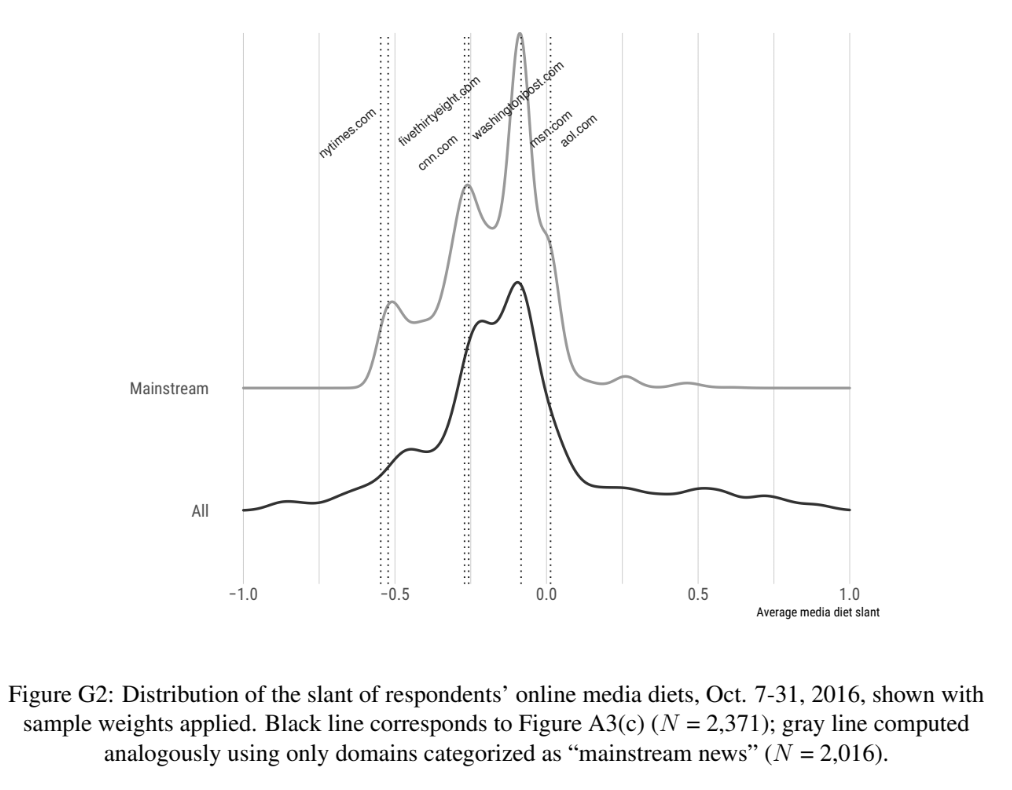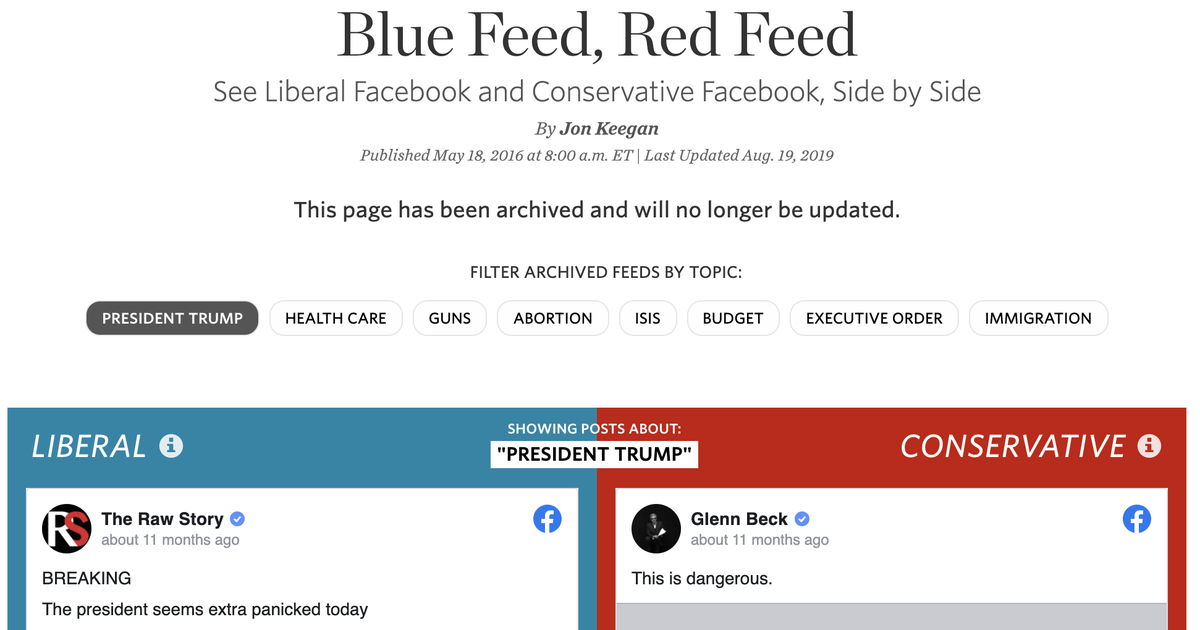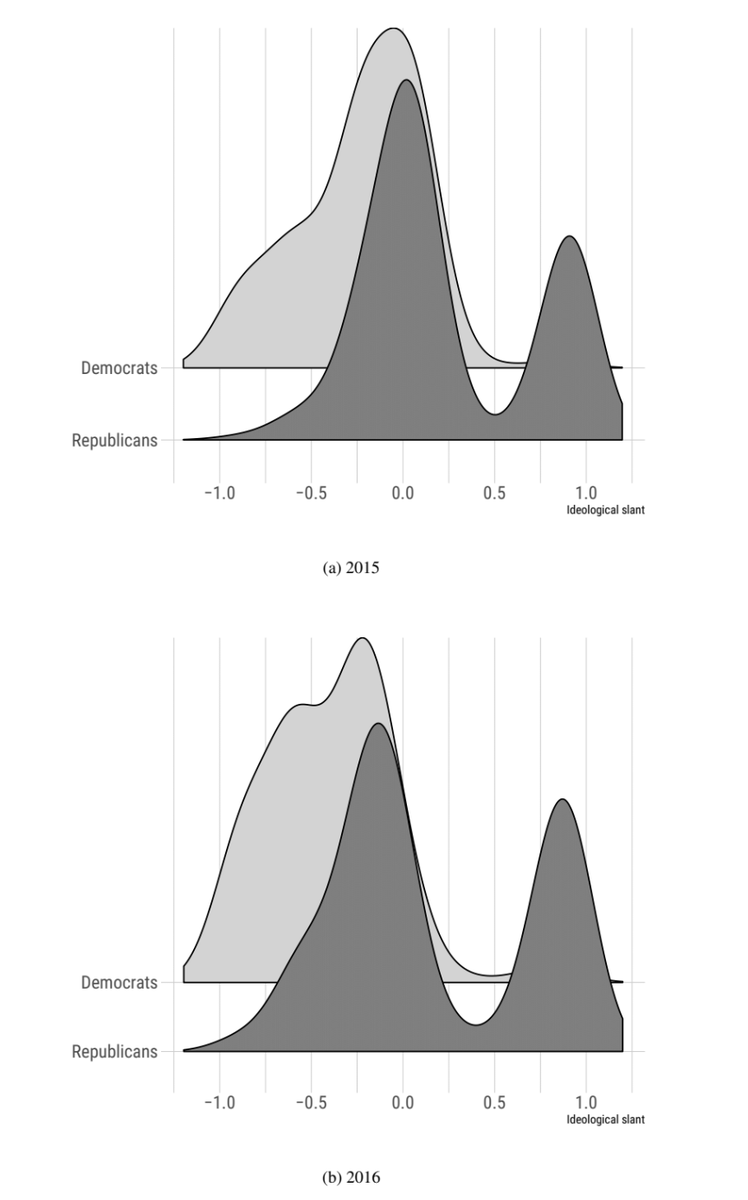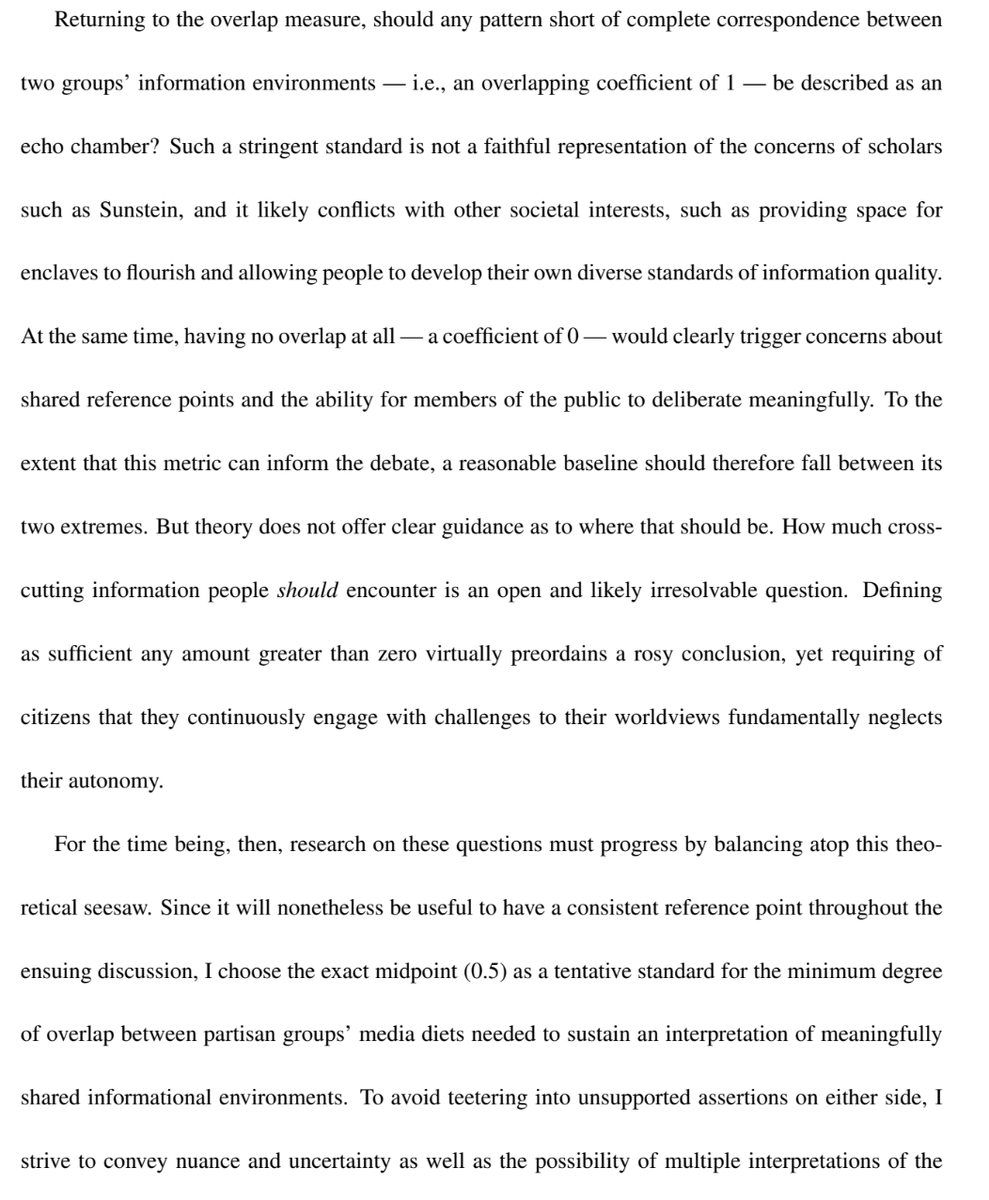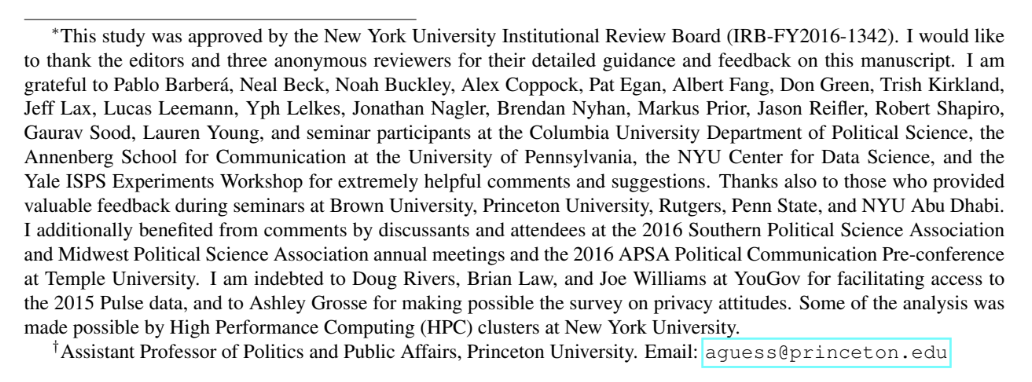My paper "(Almost) Everything in Moderation: New Evidence on Americans& #39; Online Media Diets" is forthcoming at AJPS https://abs.twimg.com/emoji/v2/... draggable="false" alt="🥳" title="Partying face" aria-label="Emoji: Partying face">. I use surveys and web visit data + a machine classifier to study online news consumption in 2015-2016. Get ready for a THREAD!
https://abs.twimg.com/emoji/v2/... draggable="false" alt="🥳" title="Partying face" aria-label="Emoji: Partying face">. I use surveys and web visit data + a machine classifier to study online news consumption in 2015-2016. Get ready for a THREAD!
Preprint: https://www.dropbox.com/s/3rjsnp8k3im7377/AGuess_OMD_AJPS.pdf?dl=0">https://www.dropbox.com/s/3rjsnp8...
Preprint: https://www.dropbox.com/s/3rjsnp8k3im7377/AGuess_OMD_AJPS.pdf?dl=0">https://www.dropbox.com/s/3rjsnp8...
If you follow me, you might& #39;ve encountered the headline finding before: contra @CassSunstein and others who argue that we& #39;re increasingly siloed into informational cocoons, people mostly rely on centrist media. As a result, news consumption patterns of Dems + Reps overlap a lot.
Why? My favored explanation is that @CassSunstein is right in another way: portals (think http://MSN.com"> http://MSN.com ) structure online information architecture and nudge people toward moderation. (See new paper by @philipplenz6 @CassSunstein et al. for an elaboration of the logic.)
Their role is subtle: if I pull them out, the overlap in D/R media habits persists but the distributions are a bit less anchored to the center. Big mainstream outlets (NYT, CNN) also play an important role. Together w/ portals they make up 1/4 of visits to news-related domains.
But we also shouldn& #39;t overlook the fundamental fact that following news about politics isn& #39;t as common as it seems #OnHere. Less than 10% of all visits were to news-related domains, and my classifier predicts that fewer than 1/4
of those were politically relevant news articles.
of those were politically relevant news articles.
There& #39;s a lot going on in addition to that headline finding. Critically, the minority of people who *do* have uniformly liberal or conservative information diets aren& #39;t like everyone else: e.g., I show that such people are more likely to turn out in general and primary elections.
Also, there& #39;s no use pretending that the graphs are symmetric; @YBenkler @cyberhalroberts et al. document the network ecology underlying this pattern extensively. https://www.oxfordscholarship.com/view/10.1093/oso/9780190923624.001.0001/oso-9780190923624">https://www.oxfordscholarship.com/view/10.1...
Interesting, you might say, but 2016 was eons ago. Two points: (1) I do find more polarized media patterns in 2016 than 2015, although it could also reflect the timing (closer to the election).
(2) Despite that there& #39;s good reason to think that moderation and relative centrism are the norm for most, even today and incl. social media. Take a new working paper by @wrahool @feedkoko @ylelkes, who describe Twitter as a "remarkably centrist platform": https://www.washingtonpost.com/politics/2020/07/09/our-study-found-little-evidence-that-twitter-is-biased-against-conservative-opinion-leaders/">https://www.washingtonpost.com/politics/...
Then why are perceptions so removed from the lived online reality of most people? The idea that we live in a post-truth world lacking shared reference points, and that this is fundamentally caused by the internet, is understandably very seductive.
Per @kmmunger our priors are driven by personal experience, and we& #39;re prone to generalizing from our particular academic/media bubble. This especially goes for media folk dedicated to the echo-chambers narrative, which might accurately describe them! https://kf-site-production.s3.amazonaws.com/media_elements/files/000/000/133/original/Topos_KF_White-Paper_Nyhan_V1.pdf">https://kf-site-production.s3.amazonaws.com/media_ele...
The narrative can be actively misleading. E.g.: the "Red Feed, Blue Feed" simulation popular in 2016 excludes the large mainstream sources that I show are so important http://graphics.wsj.com/blue-feed-red-feed/
This">https://graphics.wsj.com/blue-feed... is selecting on the dependent variable — the examples are designed to be partisan.
This">https://graphics.wsj.com/blue-feed... is selecting on the dependent variable — the examples are designed to be partisan.
Arguably most important, when you disaggregate from individuals to the raw URL data, what looked like evidence that echo chambers are limited to a relatively contained partisan subgroup blows up to something more closely resembling the narrative.
That& #39;s of course because people in that subgroup are reading more political news articles overall. But even if this is a distortion, it& #39;s one that could feed back and have real effects by driving traffic (and therefore the priorities) of news producers.
There& #39;s lots of technical detail in the paper, including my scraping process for millions of pages, setting up the classifier, and validation of the web visit data (which I explain is superior to surveys for studying media use). I hope others can keep improving on these methods!
The review process led me to confront difficult questions. For instance, people talk about the benefits of exposure to diverse views, but how much is normatively desirable? I don& #39;t have the answer, but I found a way of articulating the problem that I like.
I started working on this project more than five years ago when I got my hands on some of the first @YouGov / Wakoopa data from early 2015. The backstory on how I obtained that data in the first place goes back even further (warning: getting self-indulgent) ...
While in grad school, I worked in CBS News& #39; Election Unit and got to know the decision desk team including @doug_rivers. By that point I was convinced that tracking data was the way forward for research on internet media and politics. (see: https://www.cambridge.org/core/journals/political-analysis/article/measure-for-measure-an-experimental-test-of-online-political-media-exposure/6C3A1C40E789E076F20E6E32C4B6A359)">https://www.cambridge.org/core/jour...
At one of the group& #39;s late-night dinners as we prepped for Election Day 2014 (!), I told Doug what I thought was possible with browser plug-ins. He was interested not least because, he told me, experiments were already under way at YouGov.
From that point on I made it my mission to be involved. I eventually got connected to the group setting up the early Pulse panel, and I did my grad-student best to make myself useful as I gently persisted in my goal. I succeeded thanks to the generosity of Brian Law & others.
This project was significantly shaped by invaluable early feedback and encouragement from many — shout-outs to @BrendanNyhan @p_barbera @Jonathan_Nagler @soodoku and the many I try to list below.
Again, the paper is here. Feedback + thoughts welcome!!! https://www.dropbox.com/s/3rjsnp8k3im7377/AGuess_OMD_AJPS.pdf?dl=0">https://www.dropbox.com/s/3rjsnp8...
Again, the paper is here. Feedback + thoughts welcome!!! https://www.dropbox.com/s/3rjsnp8k3im7377/AGuess_OMD_AJPS.pdf?dl=0">https://www.dropbox.com/s/3rjsnp8...

 Read on Twitter
Read on Twitter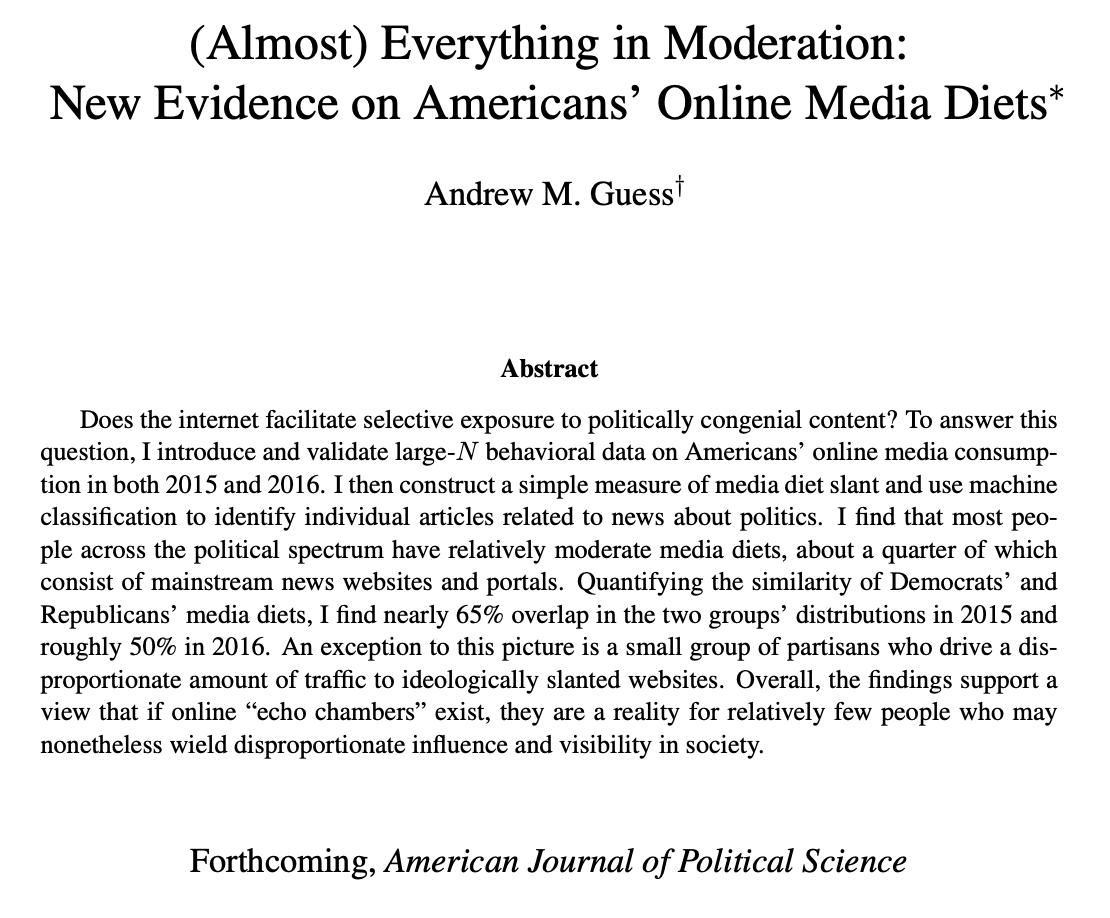 . I use surveys and web visit data + a machine classifier to study online news consumption in 2015-2016. Get ready for a THREAD!Preprint: https://www.dropbox.com/s/3rjsnp8..." title="My paper "(Almost) Everything in Moderation: New Evidence on Americans& #39; Online Media Diets" is forthcoming at AJPShttps://abs.twimg.com/emoji/v2/... draggable="false" alt="🥳" title="Partying face" aria-label="Emoji: Partying face">. I use surveys and web visit data + a machine classifier to study online news consumption in 2015-2016. Get ready for a THREAD!Preprint: https://www.dropbox.com/s/3rjsnp8..." class="img-responsive" style="max-width:100%;"/>
. I use surveys and web visit data + a machine classifier to study online news consumption in 2015-2016. Get ready for a THREAD!Preprint: https://www.dropbox.com/s/3rjsnp8..." title="My paper "(Almost) Everything in Moderation: New Evidence on Americans& #39; Online Media Diets" is forthcoming at AJPShttps://abs.twimg.com/emoji/v2/... draggable="false" alt="🥳" title="Partying face" aria-label="Emoji: Partying face">. I use surveys and web visit data + a machine classifier to study online news consumption in 2015-2016. Get ready for a THREAD!Preprint: https://www.dropbox.com/s/3rjsnp8..." class="img-responsive" style="max-width:100%;"/>

